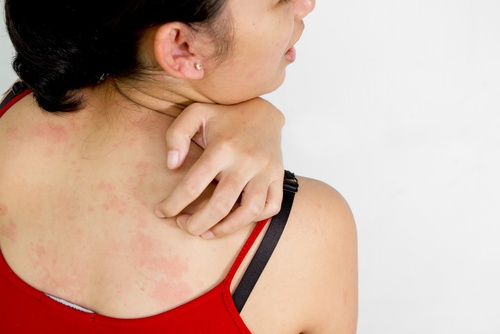During pregnancy, as the blood supply to the skin increases, it is very common to experience mild itching. You may also experience itching as the skin on your abdomen stretches. If you experience mild itching during pregnancy, there are several natural steps you can take to alleviate your symptoms.
- Regularly apply an unscented lotion or moisturizer.
- Wear clothing that is loose so it is less likely to irritate the skin.
- Try to wear clothing made of natural fibers, such as cotton, which are more breathable than synthetic materials.
How to Treat Itchy Skin During Pregnancy When Naturally Doesn’t Work
If natural options do not work, you may consider taking medication. You may also find calamine lotion beneficial in alleviating the itching. Keep in mind, however, that the safety of using calamine lotion during pregnancy and breastfeeding is unknown, so make sure to talk with your doctor before using it.
When Itching is Severe Contact Your Healthcare Provider
More severe itching may indicate an underlying liver condition known as Intrahepatic Cholestasis of Pregnancy (ICP) or Obstetric Cholestasis (OC). Your doctor may perform a set of liver function tests (LFTs) to determine if you have obstetric cholestasis. If you are diagnosed with OC, your doctor will need to regularly perform LFTS for the duration of your pregnancy to monitor the health of both you and the baby.
While there is currently no cure for OC, some options for easing symptoms include taking a warm bath or applying ice to an itchy area of skin. As OC can interfere with the absorption of vitamin K, which is necessary for proper blood clotting, your doctor may also recommend that you take a vitamin K supplement.
OC is a liver condition that disrupts the flow of bile in the body during pregnancy. Bile salts generally flow from the liver to the digestive tract to aid in digestion. With OC, the flow of bile is disrupted causing a buildup of bile in the body. This can cause severe itching all over the body, although for some women, itching occurs primarily on the hands and feet.
Such itching may worsen at night but is not typically accompanied by a rash. Other symptoms may include dark urine, gray bowel movements, and Jaundice (yellowing of the skin and whites of the eyes).
OC occurs most commonly during the third trimester, although it can develop earlier. The good news is that it generally subsides within a few days after delivery.
While OC affects less than 1% of pregnant women, it is a potentially serious condition that needs to be monitored by your doctor, particularly as it increases the risk for pregnancy complications such as preterm birth and stillbirth.
An additional condition that may cause itchiness is prurigo of pregnancy
This condition is characterized by small, itchy bumps on the skin which may be mistaken for insect bites. Prurigo can occur at any point during pregnancy and may continue post-delivery. Many believe it is caused by changes in immune function during pregnancy. Fortunately, prurigo poses no risk to your baby.
To treat prurigo, your doctor may prescribe topical emollients or steroids combined with oral antihistamines.
For OC, it is not recommended to use antihistamines or corticosteroid creams during pregnancy as they may be harmful to your baby. However, medications, such as Urso, can help reduce bile in the mother’s blood.
These medications also alleviate itchiness and reduce the risk of complications for the fetus. Urso is safe to take during pregnancy, although caution is advised when using it while breastfeeding.
While such medication may help treat OC, your doctor may also want to induce labor early to prevent complications such as stillbirth. If you have OC, make sure to talk with your doctor or midwife about your options.
Want to Know More?
- Skin Changes During Pregnancy
- How Your Body Changes During Pregnancy
- Treating Mosquito Bites Naturally During Pregnancy
Compiled using information from the following sources:
1. ICP Care. (n.d.). What is ICP? Overview.
2. Mayo Clinic Staff. (2014, August 16). Cholestasis of pregnancy.
3. National Health Service. (2014). Itching and obstetric cholestasis in pregnancy.
4. PDR Network. (n.d.). Drug summary: Urso 250/Urso Forte.
https://www.pdr.net/drug-summary/urso-250-urso-forte?druglabelid=2807
5. PDR Network. (n.d.). Drug summary: Calamine.
https://www.pdr.net/drug-summary/calamine?druglabelid=2638
6. Sachdeva, S. (2008). The dermatoses of pregnancy. Indian Journal of Dermatology, 53, 103-105. doi: 10.4103/0019-5154.43203
7. The American College of Obstetrics and Gynecologists. (2014). Skin conditions during pregnancy.
https://www.acog.org/Patients/FAQs/Skin-Conditions-During-Pregnancy






